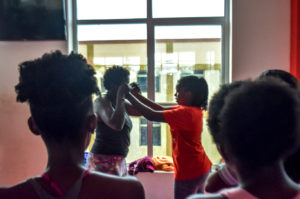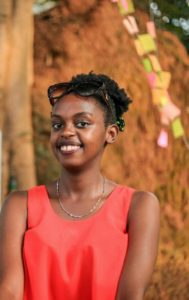Before bell hooks wrote Sisters of the Yam: Black Women and Self-Recovery, she started a support group under the same name. At the time, she was a lecturer at a university and she found that her black female students were coming to her to confess the truth of their lives. That they were beaten down and stressed, that they carried their traumas from past hurts with them, traumas of rape, incest and domestic violence; that they suffered from low self-esteem and imposter syndrome, that they were bulimic, anorexic and drug addicted.
She found that although they came from privileged backgrounds, they still faced and suffered from these problems. Hearing these women, she felt that they needed a support group and she helped organize one.
She writes, “Our collective hope for the group was that it would be a space where black women could name their pain and find ways of healing.”
In Kampala, 2019, two girls in law school found these words speaking to them. I got to know Fionah Komusana and Joanita Najjuko because they were looking to create a place for students in institutions of higher learning (especially women) to undertake their feminist journey. Even before we met, I had seen the need for this space and imagined something similar.
We dreamt of a meeting where students could gather to share experiences and knowledge while reflecting on strategies to navigate and eventually dismantle the patriarchal world we live in. We wanted to create feminist circles of learning. To train young and emerging thought leaders in feminist theory who would then pass on these lessons to others. To create a feminist mafia, so to speak.
Although this was valid and is still necessary, we realized that the need for a safe space for these girls was as crucial and as immediate.
The 2016 Uganda Demographic and Health Survey revealed that up to 22% of women aged 15-49 in the country had experienced some form of sexual violence.
In 2018, of 1.3 million adults living with HIV, 770 000 (59.23%) were women and new HIV infections among young women aged 15–24 years were more than double those among young men. These numbers are just proof of how dangerous this unequal world is for women and girls.
All three of us had recently lived the student life, and every day girls like us who leave their homes and go to study at university face the same challenges their mothers faced. From casual sexism, sexual harassment from peers and authority figures alike, body policing, misguided messages about their sexual and reproductive health, sexual assault and violence.
It is a public secret that sexual harassment is happening in universities across the country and the continent, yet little to nothing is being done to curb it. In 2018, Makerere University, the biggest institution of higher learning in Uganda, released a report confirming the existence of sexual harassment at the institution and called for new policies but not much else has been done since. Out of approximately 47 universities in Uganda, it is the only one that has a sexual harassment policy. This has created room for sexual harassment to be perpetuate with near impunity. The constant barrage of these messages will eventually take a toll on girls’ mental health.

Our vision had to adjust to create a space for continuous discussions on the issues that women in these institutions face. A place where they can come to at the end of a long week to talk about the frustrations, from a misogynist lecturer or an entitled man on the street. A place to unpack past traumas and unlock their full potential. A place where they could fully be themselves. And while we are doing that, we can introduce feminist thought as a way to root our survival and resistance. Providing them with the tools to find their power.
That is how Hub For Her came into existence. We also have a goal to educate young students especially women on women’s history, women who fought for us to be included in these very institutions as well as be a centre for knowledge to confront the systems of oppression that hold us back.
Our first initiative is focused on Uganda Christian University where we have so far organized Zumba classes, a documentary screenings and conversations. As part of the global 16 days of activism campaign, we hosted a self-defence class in partnership with Fitclique Africa which was a veritable success.
We are sharing a collection of anonymous texts from students detailing their experiences with sexual harassment under the #16storiesfor16days. The idea behind this is to start and eventually normalise conversations on sexual assault and sexual harassment so that the burden of shame and guilt is removed from the victims and transferred to the perpetrators.
We are also conducting a survey on sexual misconduct and sexual assault to properly gauge how pervasive the problem is on this campus in order to inform much needed response and recourse in the form of sexual harassment policies in these tertiary institutions.
In the new year, we will have created a smaller group where each member can host other students in their owns spaces like hostel rooms on a bi-weekly basis to discuss issues like consent and it’s nuances, body positivity and sex positivity while sharing stories and experiences as survivors of sexual and gender based violence.
While we embark on this journey we are faced with the risk of not being able to assist the people who share their stories in a way that is meaningful and satisfactory. We work on referral pathways with people and partners that can help with legal and psycho-social support ie other feminist organizations with resources. But we are aware the response to young women’s issues is still wanting.
Although we have just started out, we are confident in this vision and we are confident in our abilities to carry this through. African women need all the help they can get in this patriarchal world and who better to support us than each other.

Vivienne Kabarungi is a radical African feminist and communications practitioner who is passionate about making this world a better place for women and marginalized people.
